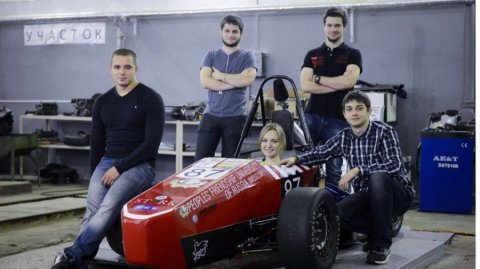For Russia, power engineering is one of the most prospective areas of science and technology development, which ensures implementation of the country’s competitive advantages. One of the key strategies for development of the country is the EnergyNet National Technology Initiative. South Ural State University develops and implements prospective projects in the sphere of power engineering in accordance with the all-Russian initiative by introducing smart technology of the Industry 4.0.
Development of an intelligent power engineering system
Students of the SUSU Institute of Engineering and Technology’s Power Engineering Faculty study the entire process chain of the power engineering industry: generation, transmission, distribution, regulation and consumption of electric and thermal energy. A strategy of development entitled “Distributed digital power engineering and intelligent electric drive” has been approved and implemented at the Faculty.
“Further development of contemporary power engineering is impossible without digitalization and computerization. Our goal is to make all elements of power engineering system to be intellectual. For example, there are 5 electric energy sources at the territory of SUSU: gas generation station, gas-turbine station, wind power plant, power energy accumulator in the form of a system of rechargeable batteries which accumulate energy produced by the wind power plant, a fixed network, and a deployed consumption system. Our immediate objective is to digitalize all university’s sources of power generation and consumption. At the second stage, it will be necessary to create an intelligent supersystem which will control all these energy flows from the position of power efficiency and energy saving,” says Head of the Department of Theoretical Basics of Electrical Engineering, Doctor of Sciences (Engineering), Sergey Gandzha.
.jpg)
Photo: S.A. Gandzha
The EnergyNet National Technology Initiative intends for elimination of obstacles for new technology development in the power engineering industry, including the segment of intelligent distributed power engineering, distribution networks, internal generation and consumption. Therefore, development of a local “smart” energy system inside the university will allow spreading the obtained results over both the Chelyabinsk region and Russia.
Discoveries are made at the intersection of disciplines
Power Engineering Faculty pays special attention to establishment of interuniversity (inter-department) and international scientific collaborations with colleagues. First of all, integration inside the SUSU’s Institute of Engineering and Technology is very important. For example, in February of 2018, the SUSU Power Engineering Faculty joined the Automobile and Tractor Faculty within the Electric Race Car project, as part of the project-based learning strategy.
“Using the innovative engineering possibilities of the university, such as supercomputer with all necessary licensed software or collective use centers for manufacture of complex assemblies and elements, students were given an assignment to independently design and produce a dynamic, power-efficient, noiseless and eco-friendly electric race car. A model of the unique innovative electric motor, which complies with all of these requirements, had been elaborated at the Power Engineering Faculty. Having combined our efforts with specialists of the Automobile and Tractor Faculty, we managed to make a step forward in producing a real-life test sample,” explains Sergey Anatolyevich.
Aside from this, scientists of the SUSU Power Engineering Faculty together with the Institute of Architecture and Construction and the School of Electrical Engineering and Computer Science are developing a unique project of a power efficient house.
“This project is quite difficult, it can’t be completed by only using resources of the Power Engineering Faculty,” says Sergey Gandzha. “At the present time, all significant engineering ideas are generated at the intersection of disciplines. Power engineers are solving the resource supply problem; architects create concordant interior and landscape design; computer technology specialists provide implementation of smart concept of the house.”

Practice-based learning is a ticket to successful career
Partnership of South Urals State University’s Power Engineering Faculty with the largest industrial enterprises of the Chelyabinsk region allows performing training of engineers in specialties which are in demand. For example, partnership agreements have been signed with Russian Electric Motors (REM) JSC.
“This is a new plant where the whole cycle of electric motors production is to be organized: manufacture of component parts, assembling, testing of the products. Within cooperation with the enterprise, SUSU is going to introduce special project-based disciplines into the education process, as well as schedule joint research and applied works in order to enhance engineering characteristics of the products that is planned to be released at the REM plant. We already have the agreement on joint elaboration of wind power plants from 10 kW to 1 MW,” confided Sergey Anatolyevich about his plans.
Power Engineering Faculty has long-standing fruitful cooperation with ChTPZ PAO. SUSU scientists together with students introduce their inventions in the sphere of power efficiency and power saving, as well as bring to life the concept of “smart” illumination at the plant. Starting from their third year of study, students get actively acquainted with the enterprises which usually become their future job sites. They are such companies as Chelyabenergo, MES (Magistral Power Networks), MMK, ChMK, ChEMK, ChKPZ, etc.
Education process at South Ural State University inextricably connected with research and development and its practical application. A student, while getting basic knowledge during classes, uses them in the course of work over a real-life project. Such specialists, who have a good theoretical background and practical skills for implementation of certain projects, will be in-demand on the labor market.




